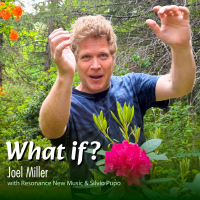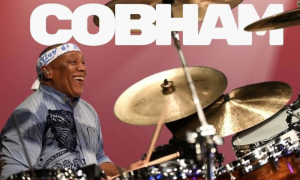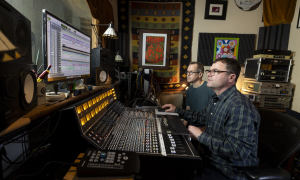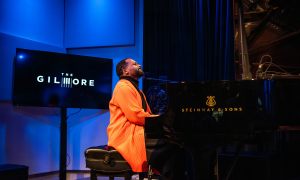
Spike Wilner is a pianist who operates two jazz clubs in New York City with his partners Chris Borden and Lee Kostrinsky. Smalls and Mezzrow are within a short walk of one another in Greenwich Village. They present familiar artists like Lew Tabackin, Frank Lacy, Pete Malinverni, Johnny O'Neal and Wilner himself, as well as those emerging in the jazz community—trumpeter Phillip Harper, pianist Ehud Asherie and singer Marianne Solivan among them. Of Small’s, The New Yorker wrote:
This subterranean hot spot is the quintessential jazz dive—a tiny, dark dungeon of a room with walls of brick and cobblestone, a few dozen ragtag wooden chairs, and of course, formidable music makers who play round midnight.
Periodically, Mr. Wilner posts an email newsletter about his clubs’ activities or simply about whatever is on his mind. What was on his mind in his most recent newsletter addresses something that concerns many veteran musicians and fans. When albums or club sets confront listeners with a dozen self-congratulatory original compositions containing no reference to anything they can relate to, listeners drop out. It doesn’t have to be that way. Mr. Wilner writes of a listening experience that is disappearing.
I recently paid a visit to my father who lives on the New Jersey shore. I took him out for a steak at a local steak house that had been there forever. We sat in the dimly lit restaurant and there in the corner was a piano and an old-timer playing it. We ordered our food and conversed, and I listened and observed this pianist. It was something that I hadn’t seen in a long time, a real cocktail pianist. Having donned a tuxedo and sat behind dimly lit pianos playing for indifferent audiences for many years, I have a deep sympathy and admiration for those who can do it.
This gentleman (who turned out, I learned later, to be 80 years old) played in a style that no longer exists. One tune after another, great old chestnuts such as “Dancing In The Dark”, “Deep In A Dream”, “Indian Summer”—one after the other in a continuous segue. Not jazz either, no “blowing” or hip originals or far out harmonies or grandstanding but just the tunes—played clearly and simply and with the most correct chord changes you’ll ever hear. I mentioned to my Pop, “This is a rarity, like seeing a dinosaur.” I observed this guy play, with a gentleness and grace, while televisions blared and people talked at the top of their lungs and some stupid kid walks by and plays “chopsticks” while the guy is in the middle of tune. He is unfazed. Just patient and playing his songs—creating a lovely background fabric for the restaurant. A lost art, indeed, this style of cocktail piano.
It made me think about humility, and particularly humility as the kind of musician who can serve a public and create a music that is not a “performance” but rather something environmental—lovely background for people as they eat and speak. In this day and age of self-proclaimed masters on Facebook, extolling their own virtues or emailing about their EPKs of their “amazing” shows to promote themselves. Or musicians who simply regurgitate what they think is hip, or the self-righteous ones who claim lineage to some kind of tradition—they all need to shut up and sit in a corner and play for five hours with minimal breaks (this guy didn’t take one in the entire time we sat there, not one).
Musicians today need to learn about service and also about taste and playing tunes correctly, really knowing those melodies and the right chords, not the ones taken from some jazz class. It’s hard to play this way. It can be crushing, but it’s real work, something that a lot of young musicians have never known or have forgotten about. Real musical work, which is to say, not playing your original tunes for a one-hour set in front of an appreciative audience but rather as a way to create background. A throwback to the days before iPods when the only way to have music in a restaurant was to hire a pianist.
It made me think about the great masters that I’ve known in my lifetime—musicians like Harry Whitaker or Mark Thompson or Walter Davis, Jr.—they were musicians who knew about work, could play in pizzerias, could play for hours without complaint, who were joyful and not slanderous but through their love of music saw only the good qualities in others—musicians, who like boulders in a river that have been rubbed smooth by the current, were natural, uncomplaining and spoke with their hearts. Humility, Taste and Grace—the highest qualities a musician can aspire to and what is most sorely needed today.
For information about Smalls, go here, about Mezzrow, go here.
This subterranean hot spot is the quintessential jazz dive—a tiny, dark dungeon of a room with walls of brick and cobblestone, a few dozen ragtag wooden chairs, and of course, formidable music makers who play round midnight.
Periodically, Mr. Wilner posts an email newsletter about his clubs’ activities or simply about whatever is on his mind. What was on his mind in his most recent newsletter addresses something that concerns many veteran musicians and fans. When albums or club sets confront listeners with a dozen self-congratulatory original compositions containing no reference to anything they can relate to, listeners drop out. It doesn’t have to be that way. Mr. Wilner writes of a listening experience that is disappearing.
I recently paid a visit to my father who lives on the New Jersey shore. I took him out for a steak at a local steak house that had been there forever. We sat in the dimly lit restaurant and there in the corner was a piano and an old-timer playing it. We ordered our food and conversed, and I listened and observed this pianist. It was something that I hadn’t seen in a long time, a real cocktail pianist. Having donned a tuxedo and sat behind dimly lit pianos playing for indifferent audiences for many years, I have a deep sympathy and admiration for those who can do it.
This gentleman (who turned out, I learned later, to be 80 years old) played in a style that no longer exists. One tune after another, great old chestnuts such as “Dancing In The Dark”, “Deep In A Dream”, “Indian Summer”—one after the other in a continuous segue. Not jazz either, no “blowing” or hip originals or far out harmonies or grandstanding but just the tunes—played clearly and simply and with the most correct chord changes you’ll ever hear. I mentioned to my Pop, “This is a rarity, like seeing a dinosaur.” I observed this guy play, with a gentleness and grace, while televisions blared and people talked at the top of their lungs and some stupid kid walks by and plays “chopsticks” while the guy is in the middle of tune. He is unfazed. Just patient and playing his songs—creating a lovely background fabric for the restaurant. A lost art, indeed, this style of cocktail piano.
It made me think about humility, and particularly humility as the kind of musician who can serve a public and create a music that is not a “performance” but rather something environmental—lovely background for people as they eat and speak. In this day and age of self-proclaimed masters on Facebook, extolling their own virtues or emailing about their EPKs of their “amazing” shows to promote themselves. Or musicians who simply regurgitate what they think is hip, or the self-righteous ones who claim lineage to some kind of tradition—they all need to shut up and sit in a corner and play for five hours with minimal breaks (this guy didn’t take one in the entire time we sat there, not one).
Musicians today need to learn about service and also about taste and playing tunes correctly, really knowing those melodies and the right chords, not the ones taken from some jazz class. It’s hard to play this way. It can be crushing, but it’s real work, something that a lot of young musicians have never known or have forgotten about. Real musical work, which is to say, not playing your original tunes for a one-hour set in front of an appreciative audience but rather as a way to create background. A throwback to the days before iPods when the only way to have music in a restaurant was to hire a pianist.
It made me think about the great masters that I’ve known in my lifetime—musicians like Harry Whitaker or Mark Thompson or Walter Davis, Jr.—they were musicians who knew about work, could play in pizzerias, could play for hours without complaint, who were joyful and not slanderous but through their love of music saw only the good qualities in others—musicians, who like boulders in a river that have been rubbed smooth by the current, were natural, uncomplaining and spoke with their hearts. Humility, Taste and Grace—the highest qualities a musician can aspire to and what is most sorely needed today.
For information about Smalls, go here, about Mezzrow, go here.

























